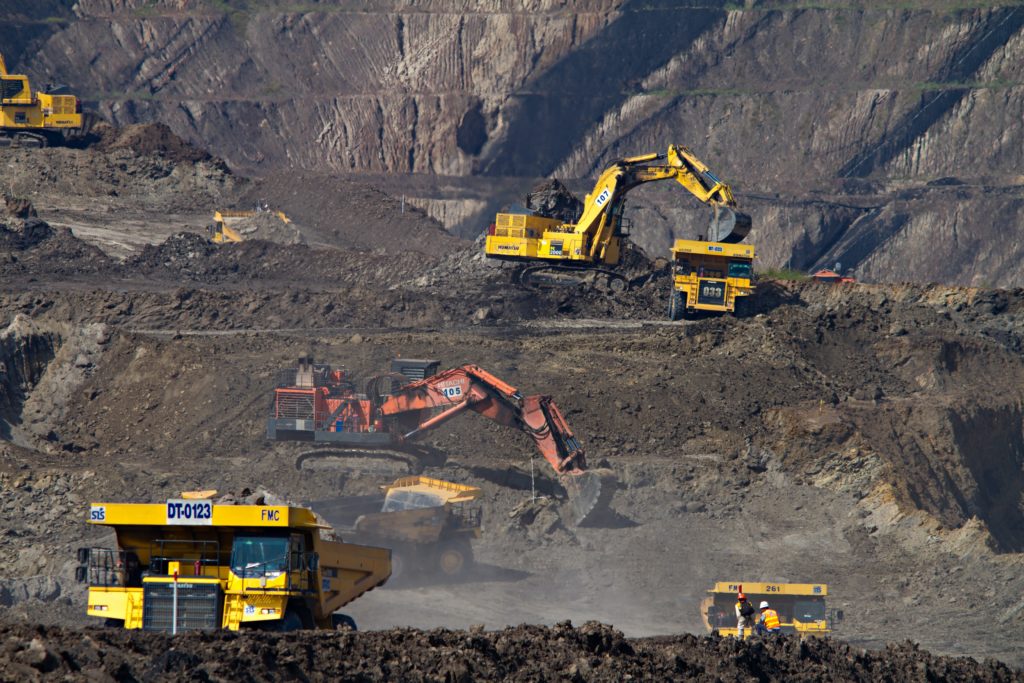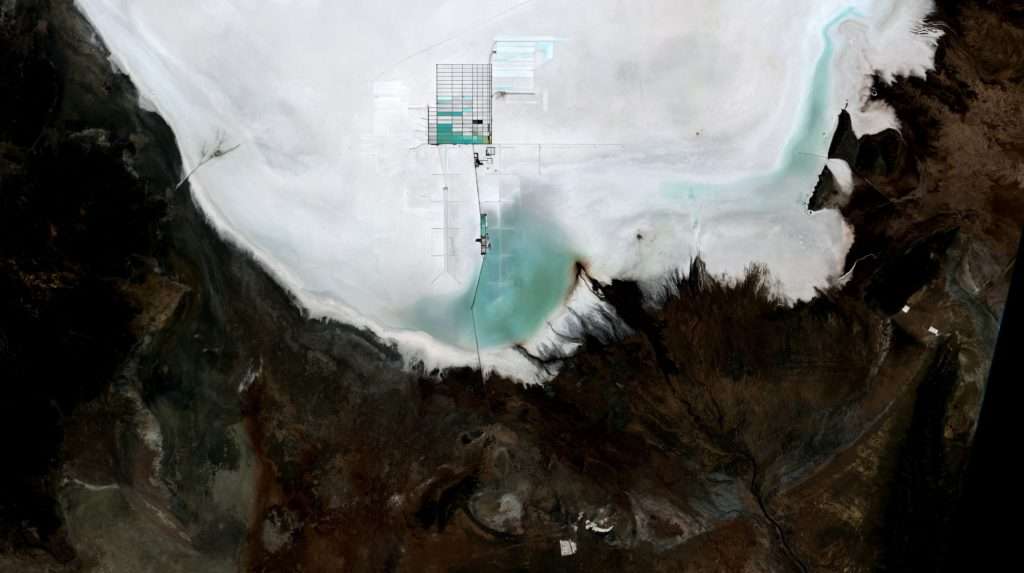By: Dayna Scott, [York University, Canada]
This post is a part of our Keywords for Decolonizing Geography series. It was originally published as part of an article titled “Infrastructure, Jurisdiction, Extractivism: Keywords for decolonizing geographies” in the journal Political Geography.
To parse out the meaning of extractivism in the context of our work on infrastructure and jurisdiction, I seek to do two things. First, I want to re-iterate the point that extractivism is best conceived not as an activity or a thing, but as a relation or a logic. This leads to the second aim, which is to reflect on recent contributions by critical theorists who argue that ‘extractivism’ is discernible in a variety of places beyond the sites of ‘literal extraction’ where it is typically observed. This insight exposes pressing challenges in confronting the transition to “post-extractive” futures.
To begin, we can think about extraction itself as the taking of minerals, oil and gas or other elements from the earth. But then when we start to think about extractivism — not as the concrete activity of ‘taking’ but as a way of relating – we recognize that it comes with a particular logic or a political economy, and we can begin to pull out some of its essential features. Extractivism, it becomes clear, is a mode of accumulation that necessitates both a high pace and a large scale of taking (Acuña, 2015). It has a certain intensity or recklessness in terms of concentrated impacts: voracious water demands, suffocating air emissions, vast wastelands, and a trail of toxic tailings. It is in this regard that Eduardo Gudynas (2018, p. 69) references the emergence of a new term in the South American context – extrahección – which derives from the Latin word extraher, meaning ‘to pluck with violence.’
Scholars have long emphasized how violent the classic extractivist economy is in generating benefits for distant peoples and economies to the detriment of local peoples and ecosystems. This obvious imbalance, or non-reciprocity, is a defining characteristic of the relation. Extractivism is also oriented to the short rather than long term and is organized around external demands and priorities. In other words, the need for the taking comes from somewhere else. Not only does it fail to derive from the visions, goals and aspirations of people grounded in political communities on the territories from which the taking is done, but the extraction proceeds despite its incongruence with those visions for the future. As Alberto Acosta says, “extractivism is essentially predatory” (2017, at para 26). It suffocates life.

Even as we recognize the global assemblages that support it, we must recognize that the ‘taking’ necessary for extractivism happens in specific places where those resources are found. This is what Macarena Gómez-Barris (2017) calls the “extractive zone”; those resource-rich regions of high biodiversity, where complex social ecologies and lifeways are dismantled to achieve conversion of environmental elements into ‘resources’ for capital. Gómez-Barris explains how dispossession from the means of social reproduction – the land base – is necessary for ‘wealth’ to be extracted. But she also reveals the way in which people in communities also come to be evaluated through an extractive logic: they are reduced to their capacity to provide wage labor for a resource economy. In fact, in Naomi Klein’s conception of extractivism, we see the reduction of all life into “objects for the use of others, giving them no integrity or value of their own” (2014, 169).
But extractivist logics have generated resistance on the ground everywhere, and powerful counteractions from Indigenous communities in particular. Here we can point to the ways in which the logic of extractivism exists in direct contradiction to the orientation of many Indigenous legal orders. As the work of many Indigenous scholars have powerfully brought forward, these legal orders often include principles of deep relationality with lands, waters and other beings, an understanding that those elements exist in relation to each other, and that those relations include not simple rights to take but obligations to protect and steward (see for example Stark, 2010). It is these Indigenous legal orders that provide the most direct challenge to the extractivist logics that make up the very structure of settler colonial law (Clifford, 2019).
According to current public law frameworks across the settler colonial world, Indigenous peoples do not have the right to consent to development (or to “veto” developments) proposed for their territories. As Michi Saagigi Nishnabeg theorist Leanne Betasamosake Simpson shows, this itself exposes an extractivist mentality: “… they are not seen as peoples – they are seen as resources” (Klein, 2013). But instead of open contestations over the norms and principles that should govern the public authorization of resource extraction, in practice, extractivism often enters onto Indigenous territories insidiously through private contract. In liberal circles, we are encouraged to receive this as an expression of ‘agency’ by the contracting Indigenous authority: ostensibly an equal party to bilateral negotiations with the resource corporation. But this regime of impact-benefit agreements (IBAs), as I have argued, sees contracts proliferating, with state support, in the settler state’s interests (Scott, 2021). In fact, the private contractual regime is now centrally responsible for normalizing and facilitating the state’s continued provision of access to Indigenous lands for extractive capital, which is, as Glen Sean Coulthard shows, the central imperative of the settler colonial state (2014).
But these principles must be contested. Despite the fact that the IBA regime itself was ushered into existence only through determined Indigenous resistance to the settler state’s relentless drive towards accumulation by dispossession, the significance of the turn to contracts cannot now be understood without seeing how it imports and extends extractivist logics. With the contracts satisfying parties in the short-term as well as contributing to the pacifying and criminalizing of extraction’s critics, we lose ground in the long-game – in the struggle to discredit the prevailing public law schemes that systematically deny Indigenous peoples’ territorial governing authority. But we must also guard against the sense that settler state tactics are producing ‘order’ on the resource frontier. Instead, what characterizes the networked flows of fossil fuels, minerals, labourers and capital in and out of the extractive zone is friction, disorder, and “layered sovereignties” (Watts, 2021, 212). The persistent spectre of litigation risk that accompanies the slow disintegration of the settler state’s claim to exclusive territorial authority means that intractable uncertainties, complexities, and pluralities are creating openings for new assertions and reclamations of Indigenous jurisdiction (Pasternak & Scott, 2020). Incrementally and inevitably, these are shifting the terrain of struggle.

I want to move on now to reflect on an emerging body of literature attempting to extend and expand the application of extractivism much further beyond the ‘extractive zone’. Thinkers like Veronica Gago and Mezzadra (2017), Sandro Mezzadra and Brett Neilson argue that when we focus only on ‘literal’ sites of extraction, those of mining or fossil fuel projects, we tend to forget about the larger political economy that is driving the extractive logic, and we miss how it is extending into many other spaces and contexts. These scholars insist it is not just that raw materials are turned into commodities: extractivist logics disrupt and feed off “patterns of human cooperation and social activity” (Mezzadra & Neilson, 2017, p. 194). Extractivism attacks efforts to cooperate, collaborate and build the things – including vital infrastructures – necessary for our flourishing, together. Therefore, in order to overcome these infrastructures, we must identify extractive logics not only in oil and gas, fracking, and mining: we must learn to locate them even in new “green” infrastructure plans, battery-making proposals, the gig economy, digital infrastructures, and electric car manufacturing as well. Extraction might be about coercing certain elements of the earth into our control, but its logics are also found in continuing and evolving practices of circulation, transportation, storage, and sorting. Wherever extractive logics are operative, at each of these steps along the commodity chain, life-nurturing practices of cooperation and sociality are targeted just as they are on the literal resource frontier.
Photograph by John Cameron / Unsplash
How do we think with these extended notions of extractivism into the so-called the post-extractive future? How do we confront the fact that “much of the new violence of extraction has become cloaked in the discourse of “green development” (McNeish & Shapiro, 2021, p. 2)? The energy transition necessary to avoid climate collapse, for example, is said to demand a high volume of extraction of “critical minerals.” Do we have to accept the continuance of social exploitation, settler colonial imposition, and mass contamination that comes with mining this new frontier? Or can we organize and operationalize new forms of social and infrastructural cooperation that are resistant to extractivist logics? Can we mobilize “layered sovereignties” and “variegated legal spaces”, as Lauren Benton (2010) might say, to further destabilize the settler colonial order? These pressing questions require not only fundamentally new conceptions of consent, but also new conceptions of authority, territory, and jurisdiction.
When we interrogate extractivist logic, as Michael Watts (2021: 212) urges, “as a set of shifting dynamic frontiers produced and enmeshed in forms of contemporary racialized capitalism and empire,” it becomes clear that extractivism relies on exploiting difference. It craves hierarchy. As Mezzandra and Neilson demonstrate, it exploits “heterogeneous conditions and materials that are not of its own making” (2017, 6). Extractivism does so continually. So the violence of extractivism will persist wherever social hierarchies, irregularities and asymmetries exist, despite any contemporary cultural sensitivities, climate imperatives, or even a wholesale turn away from extraction in the strict sense of the taking of non-renewable resources. From the perspective of our analytics, it would be easier, as Mezzadro and Neilson say, if we could limit our conception of landscapes of extraction to places where this violence is visible, direct, and pronounced and where it is unmediated by complicated compensation agreements, co-management schemes, Indigenous proponents, private deal-making, and “clean development” rationales.
But it is also essential for us to find the extractive logics in those places and to counter them head on. To return again to Simpson, “The alternative to extractivism is deep reciprocity. It’s respect, it’s relationship, it’s responsibility, and it’s local” (quoted in Klein, 2013). The post-extractivist future is a decolonial future. For these reasons, any just transition must simultaneously be a social and political transition; a movement generating its own energy towards an entirely new set of logics to guide our collective decision-making. It is about “living our lives,” as Coulthard says, “in relation to one another and our surroundings in a respectful, nondominating, and nonexploitative way” (2014, p. 60).
